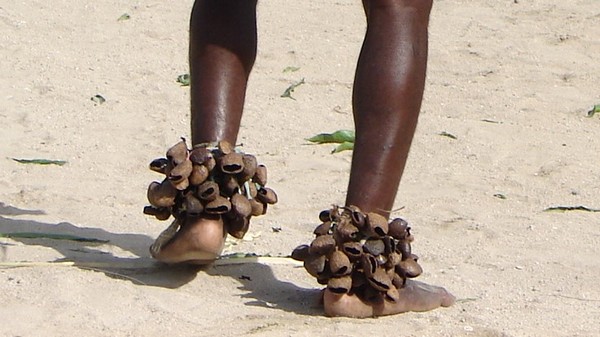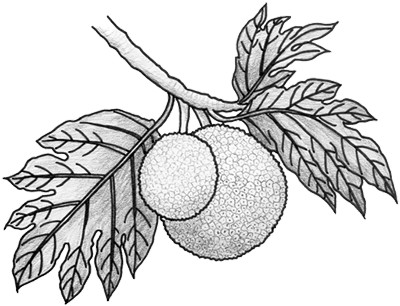lahe lahe noun

Flora
Ankle rattle tree, bsl. Nalakearbre fruitier dont on fait les grelots pour la danse traditionnelle, bsl. NalakePangium edule.
lahi lahi
PNCV, POc*laki
laku laku noun, relational
PNCV*laquoutrigger struts
small forked wooden pegs fixing the outrigger (jam̈a) to the horizontal pole (evua), and tied with vegetal ropes (asi)petites chevilles de bois en forme de fourches, permettant d'attacher le balancier de la pirogue (jam̈a) au joug central (evua), et fixées au moyen de liens (asi)
| Mo r̄ai-a asi-na, mo r̄ai-a jam̈a-na, mo r̄ai-a evua-na, laku-na.He made the ropes (for his canoe), made the outrigger, carved the central yoke and the little pegs.Il fabriqua les liens (de sa pirogue), en fabriqua le balancier, en tailla le joug central, et les petites fourches. |
langalanga laŋalaŋa postverb
Seelaŋalaŋa-i majifish scalesPNCV*laŋa-ilift flat object from surface
with ulcers: in several skin diseases (itch, scabies, hovi), langalanga is used when the dead skin drops off in piecesavec des ulcères : dans certaines maladies graves de la peau (gale ou eczéma, hovi), employé lorsque la peau morte s'en va par morceaux
| Pan r̄aju hosun mo hovhovi, hovi-na mo hovi langalanga.Now, this young man had scabies, an ulcerous scabies.Or, ce jeune homme avait la gale, une gale qui faisait partir sa peau en lambeaux. |
langi laŋi
lang
noun, relational
PNCV*laŋi
windvent
| langi-n Tahunathe southern windle vent du Sud |
| Vivara mo avu lang mo var̄i-a.The reed flies away in the wind. [lit. it flies the wind takes it]Le roseau s'envole, emporté par le vent. |
| Lang jo losu jo pa usa.There will be a hurricane [lit. the wind will strike] and it'll rain.Il y aura un cyclône et des averses. |
lap̈a lat̼a
PNCV*laba
Aadjective
1 – big, largegrand, de grande taille
| Naur̄a Lap̈a[the big isle] Santo island[le grand pays] l'île de Santo |
| Mo varai r̄ap̈ala-na mo re "Ee! O polo r̄e hap lap̈a!"He shouted to his fellow "Hey! Please light a huge fire!" |
📙 Plutôt avec un sens singulier ; pour un ensemble d'objets grands, cf. v̈alalap̈a.
📘 Mostly singular; for several large objects, cf. v̈alalap̈a.
lar̄e lare
PNCV*late
lasa lasa noun
PNCV, POc*lasacoconut half-shell cup
cup, glass, used to drink; esp. cup made out of a coconut half-shelltasse, verre, récipient utilisé pour boire
le le Tense Aspect Mood marker
1 – again, once again, backencore, à nouveau
| Va r̄aju mo le mle, mo le v̈a lo ima-n r̄am̈a-na.The young man turned around and went back to his father's house.Le jeune homme s'en retourna, et regagna la maison de son père. |
| Om r̄e hanhan mo r̄e iso, voni om re o le han r̄e hina?Have you finished your meal ? or do you still want to eat something ?Tu as fini ton repas ? ou bien tu veux encore manger quelque chose? |
| Mo v̈ei-a v̈a vara uluvo mo le smat.He carried on this way until the young man became a beautiful boy once more.Il continua ainsi, jusqu'à ce que le jeune homme redevînt beau garçon. |
leo leo noun, relational
PNCV*leo
animal, humvoice
| Nam rongo leo-m, nam rongo mo holoho.I heard your voice and I felt good.Moi j'entendais ta voix et je me sentais bien. |
lep̈a let̼a
lepa
noun
PNCV*lebamud, dirt
1 – ground, floorterre, surface du sol
| Mo voro kar̄ano lo lepa.(the arrow) falls down on the ground.Il tombe par terre. |
| Mo je les r̄e jau lo lepa.They see no coconut crab on the ground.Ils ne voient aucun crabe de cocotier par terre. |
seekar̄ano
Ler̄uvahi leruβahi placename
Anthropology
Leruvahi, a place on Araki islandLeruvahi, lieu-dit dans l'île d'Araki
EthnologieCet endroit était le lieu d'un oracle : les hommes lancent de là-haut un roseau, et connaissent leur destinée en fonction de l'arbre sur lequel ce roseau atterrit.
AnthropologyThis was where an oracle was pronounced : men threw a reed from this place and found out their destiny according to which tree the reed landed on.
lesi lesi
les
verb, transitive
PNCV*leʔo-sisee, look atPOc*leqos
see; notice, come across
| Nia mo vuso, mo je levse lesi r̄e hina.He's blind, he can't see anything.Il est aveugle, il ne peut rien voir. |
| Nr̄e ran jo pa v̈anov̈ano, jo lesi-a se jo pa v̈anov̈ano vila.One day we'll have a race, and we'll see who's the faster!Un jour, nous ferons la course, et nous verrons bien qui avance (le plus) vite ! |
| M̈ala mo kla v̈a mo lesi-a jam.The hawk looked and saw the piece of yam.Le faucon regarda et vit le morceau d'igname. |
seeklaregarderlook
leta leta noun
letter
| Na ul r̄e leta jo sivo sa-n pua.I must write a letter to [lit. which should go to] my mother. |
levosai leβosai verb, intransitive
Reduplelevosai
clever, wise, wickedintelligent, rusé, malin
| Spoemalao nia r̄aju mo hese mo levosai mo holo-ho.Spoemalao is a really clever man.Spoemalao, c'est un homme diablement rusé. |
levse leβse verb, transitive
1 – know ‹s.th., s.o.›savoir, connaître ‹qqch, qqn›
| Nam levse r̄aju mo hese jo pa r̄uen-i-ko.I know a man who can help you.Je connais un homme qui peut t'aider. |
2 – understand, realise (that, mo re)comprendre, se rendre compte (que, mo re)
| Mo levsei-a mo re r̄am̈ar̄e mo han-i-a.He realised that (his friend) had been devoured by a devil.Il comprit que (son ami) avait été dévoré par un démon. |
3 – know how to, be capable of (doing s.th.)savoir faire, être capable de (faire qqch)
| Nam levse velu.I know how to dance.Je sais danser. |
4 – be able to, succeed inpouvoir, réussir à
| Nam je levsei rongo-ko.I can't hear you.Je ne peux pas t'entendre. |
| Nia mo vuso, mo je levse lesi r̄e hina.He's blind, he can't see anything.Il est aveugle, il ne peut rien voir. |
| Mo v̈e lesi-a mo re ha nak-i-a, ha je levsei nak-i-a.They try to kill him but they do not succeed.Ils essayent de le tuer, mais ils ne réussissent pas à le faire. |
5 – be used to, (do s.th.) usuallyavoir l'habitude de
| Mohi mo levse har̄i-a r̄aju.Mosquitoes bite [lit. know how to bite men].Les moustiques, ça pique [savent mordre les hommes] |
| Nam je levsei inumi-a hae.I'm not used to [lit. I don't know how to] drinking kava.Je n'ai pas l'habitude de [je ne sais pas] boire du kava. |
levu leβu
vi-levu
noun

| Mara variri mo sivo mo sihevi lo levu.The children go and climb on the breadfruit-trees (to pick some). |
| Mo var̄i-a levu ri mo huren-i-a lo vi-pue mo r̄un-i-a mo var̄i-a mo han-i-a.They take the breadfruit, put it in a bamboo stem, cook it, and finally they take it and eat it. |
lim̈a lin̼a
PNCV, POc*lima
Anumeral
five
| Nam lahi, ran mo lim̈a, lang mo pa losu.Just five days after my wedding, we were hit by a cyclone.Juste cinq jours après mon mariage, un cyclône a eu lieu. |
| R̄av̈al wik, jo pa usa lo ha-lim̈a ran.It will rain on Friday of next week.La semaine prochaine, il pleuvra vendredi. |
Bnoun, relational
Anatomy
hand, arm; from shoulder to fingersmain, bras ; s'étend de l'épaule aux doigts
| Nam lung-i-a lim̈a-ku nam re na v̈alum isa-m.I am clenching my fists to fight with you.Je ferme le poing pour me battre contre toi. |
| Nam varai kam̈im nam re ha v̈a hojo lim̈a-m̈im!I told you to wash your hands, but they are still black!Je vous ai dit d'aller vous laver les mains ! |
ling liŋ verb, transitive
PNCV*liŋiput, leave
trlingi-
carry, take ‹s.o.› on a vehicle, esp. a canoetransporter, emporter (qqn) sur un moyen de transport, ex. pirogue
| Mo viji va p̈ir̄a mo viji mo var̄i-a mo ling-i-a mo sa lo m̈asap̈a.He brought the woman on board, and took her out towards the deep sea.Il embarqua la femme, il la prit avec lui (dans sa pirogue), et l'emmena vers le large. |
| Mo ling-i-a mo var̄i-a mo v̈a.He takes him (in his canoe) and goes on his way.Il le prend (dans sa pirogue) et continue sa route. |
synonymviji
lito lito verb, intransitive
PNCV*loto-vifoam, spit
| O kan lito!Don't spit! |
litovi- verb, transitive
spit on ‹s.o›; fig. offend, reject, humiliatecracher sur ‹qqn›; fig. outrager, rejeter, humilier
| Nam litovi-a mo le mle.I humiliated him, and he went away.Je l'ai humilié, si bien qu'il est reparti. |
| Inko hosu nanov om litovi-á?So it was you who offended me yesterday?C'est donc toi qui m'a outragé hier? |
livuha liβuha noun, relational
PNCV*livu-kamiddle, between
middle, in-between
| p̈is livuhathe middle fingerle (doigt) majeur |
lo lo preposition
1 – in, on, at: locative preposition, referring to space
| lo jara-min your countrydans ton pays, chez toi |
| Mo rovo mo mle mo sa lo ima.He fled without further ado, running back up home.Il prit ses jambes à son cou et courut rentrer chez lui. |
| O sna sarai lo p̈ili-ku.Come and sit on my shoulders.Viens t'asseoir sur mes épaules. |
2 – locative preposition, referring to time
| Lo Kr̄ismas muru mo je usa.Last Christmas, it didn't rain.Au Noël dernier [lt. premier Noël], il n'a pas plu. |
| Lo m̈auri-ku, nam je m̈isi han r̄e.I had never eaten any in my whole lifetime.Dans ma vie, je n'en avais jamais mangé. |
3 – preposition for an oblique relation, esp. when the verb is intransitive, or the object slot is already taken by another NP (see sile 'give', vse 'show', soro 'say', viris 'squeeze')
| O sle-i-á lo hina nohoni!Give me that thing! [lit. provide me with that thing]Donne-moi ça ! |
| Om soro lo sa?What did you say? [lit. you said of what?]Qu'est-ce que tu as dit? |
| Mo poe mo re jo pa tr̄aim lo aka-na.He wanted to try his canoe. [lit. try at his canoe] |
| Nam re na pa vaver̄e lo ver̄e mo hese.I'd like to sing a song. [lit. to sing at a song]Je veux chanter une chanson. |
lokoru lokoɾu verb, intransitive
Reduplolokoru
| Mo r̄angi m̈ar̄a mo levsei-a nam lolokoru nia.He's crying because he knows that I am angry at him.Il pleure parce qu'il sait que je suis en colère contre lui. |
| Nia mo lolokoru niran naivou-na.He's angry at his wife.Il est en colère contre sa femme. |
lolo lolo
PNCV, POc*lolo
losulosu losulosu noun
Birds
Broad-billed Flycatcher, small bird, 16 cmGobe-mouches à Large Bec, passereau, 16 cmMyiagra caledonica.
lpo lpo verb, intransitive
+ Directional v̈a, sitry to, endeavour: indicates a tentative or hesitating actionsuivi d'un Directionnel v̈a, siessayer de, chercher à. Signale qu'une action est provisoire ou hésitante
| Na lpo si na lesi-a r̄a. — Ale, o lpo si!I shall try and see him. — Alright, you go!Je vais essayer de l'apercevoir. — D'accord, vas-y ! |
seev̈e lestenter detry to
lulu lulu adjective
PNCV*lulubarn owl
whiteblanc
| R̄as mo re mo m̈a mo nak-i-a mo posi mo viriha mo m̈a mo lulu.Each time the waves hit it, (the octopus) changed colour, from black to white.Chaque fois que les vagues venaient le frapper, (le poulpe) changeait de couleur, tantôt noir, tantôt blanc. |
| r̄aju lulua white man, either European (tasale) or albino |
antonymviri-ha
lumiha lumiha verb, intransitive
? lumi + -ha ⑦
dirtysale
| Nam varai kam̈im nam re ha v̈a hojo lim̈a-m̈im, pan lim̈a-m̈im mo lumiha, huraurar̄a mo r̄oho r̄o nia.I told you to wash your hands, but they are still dirty, there is still some dirt on them.Je vous avais dit d'aller vous laver les mains, mais elles sont encore sales, encore recouvertes de saleté. |